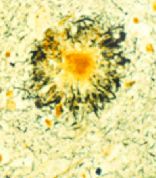
However, in light of my nominee for CAM of the year (see 12/31/07 posts) the results published by researchers from California and Osaka are interesting.
Here are the highlights from the NewsWise article.
- Omega-3 fatty acid docosahexaenoic acid (DHA) found in fish oil increased the production of LR11 (lipoprotein receptor 11) in rat and mice studies.
- LR11 is a protein found at reduced levels in patients with Alzheimer’s.
- LR11 can destroy the protein that forms the “plaques” (see the black lines in the photo) associated with the disease.
- Even at low doses, DHA increased LR11 levels in rat nerve fibers.
- Dietary DHA increased LR11 in brains of rats or older mice that had been bred to develop Alzheimer’s disease.
- The benefits of DHA were not limited to nonhuman animal cells. There was a direct impact on human nerves in cell cultures as well.
The bottom line?
Based on these positive laboratory results, the National Institutes of Health is conducting a large-scale study of DHA in patients with established Alzheimer’s disease. Lead author, Dr. Greg Cole believes, “it may be too late in the disease to help these patents, but it’s a first step that will eventually lead to research in earlier stages of the disease.”
In fact, an earlier study also concluded that the potential for omega-3 might be in people with mild dementia.
More on LR11 here.
12/27/07 14:06 JR